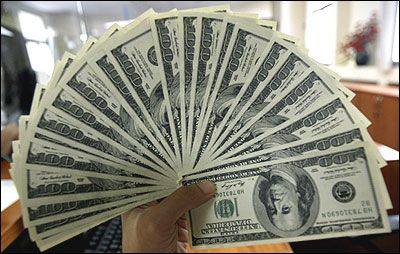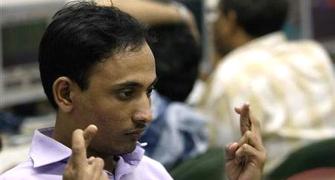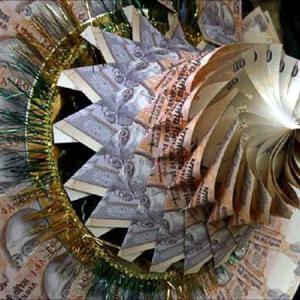Whenever the US currency appreciates, it reignites concerns about the American economy importing global deflationary trends and losing its competitive edge, says Abheek Barua & Bidisha Ganguly.
 If one is in the business of forecasting exchange rates, it should seem safe at this stage to predict that 2016 will be the year of the greenback.
If one is in the business of forecasting exchange rates, it should seem safe at this stage to predict that 2016 will be the year of the greenback.
This bullish case for the US dollar rests on the view that stronger domestic demand will make the US the only region to show above-trend levels of growth - growth that is not synchronised with the global economy.
The irony is that whenever this view becomes dominant and the US currency appreciates it reignites concerns about the American economy importing global deflationary trends and losing its competitive edge.
For now, a December rate hike is on the cards but if one cares to look a little beyond this, both the pace of rate hikes and the momentum of the currency seem uncertain.
In fact, the focus of the financial markets has now shifted from the first actual hike in December to the pace of future tightening.
The consensus is that it will be gradual, with just two or three hikes over the whole of 2016. Thus there will be long 'holding' periods for the US Federal Reserve that will fuel speculation about when the next increase will come. This means the dollar will see considerable two-way movement and this volatility could spill over to other markets.
There is logic behind this consensus view that the US central bank seems to share, as the minutes of its October policy meeting released last week clearly showed.
The global economy is growing at the slowest pace since the global financial meltdown of 2009 and the US economy is bound to feel the drag.
Data from the Eurozone showed it had grown at a sclerotic pace of 0.3 per cent in the third quarter while Japan slipped into its second recession, with two back-to-back quarters of decline in growth.
If the US economy has indeed decoupled from the downswing in major economies, any aggressive hiking will bid the US dollar too high up for comfort.
How will the other heavyweight currencies fare? The Euro region is almost a mirror image of the US, with weakening growth and prolonged deflation.
The European Central Bank has shown its willingness to provide further monetary stimulus in the not-too-distant future. In contrast, the Bank of Japan (BoJ) remains reluctant to increase its liquidity infusion even though growth has disappointed and inflation remains well below the target of two per cent.
The BoJ's reluctance is driven by the realisation among Japanese policy-makers (the original votaries of quantitative easing) that monetary stimulus is likely to have limited effect on either driving inflation rates higher or driving a substantial revival in growth prospects and that fiscal policy needs to do the real heavy lifting.
If Japan's new bet pays off, other economies may get the confidence to embark on a similar path.
Thus if one were to go by the textbook, another round of significant weakness in the Japanese yen is unlikely, given its reluctance to loosen monetary policy further while the Euro looks more vulnerable.
In this situation, sentiment towards emerging market economies is expected to remain weak.
With the high quantum of debt on private sector balance sheets and limited room for earnings growth, central banks will mostly be easing policy.
The International Monetary Fund in its Global Financial Stability Report has estimated that corporate debt of non-financial firms across major emerging markets has risen from about $4 trillion in 2004 to $18 trillion in 2014. As a percentage of gross domestic product, it has increased from less than 50 per cent to almost 75 per cent during this period.
There is more evidence of 'rotation' of investments away from these markets to the developed countries.
Clearly, all emerging economies cannot be tarred with the same brush.
Commodity producers and current account deficit runners still look the most vulnerable.
The silver lining is that a pick-up in the US economy could help emerging market exports.
Financial markets are known to be fickle and it is possible that if the US does sustain its recovery, emerging market may be in fashion again.
Abheek Barua is chief economist, HDFC Bank. Bidisha Ganguly is principal economist, CII.










